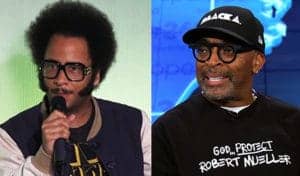by Daryl Nelson

Boots Riley has a problem with Spike Lee’s “BlacKkKlansman,” and he explained why in a three page essay.
Besides being the veteran rapper from Oakland’s The Coup, Riley is also a filmmaker who created the movie “Sorry to Bother You,” which, like Spike’s film, has a lot of buzz surrounding it.
If you’re familiar with the subject matter of “BlackKkKlansman,” then you know it’s based on the true life story of former Colorado Springs officer Ron Stallworth and how he infiltrated the local Ku Klux Klan through the telephone.
But Riley said that was only one of his operations, because he also worked for the FBI’s COINTELPRO to bring down Black radical groups, yet Spike made him look like a hero.
Boots Riley has a problem with Spike Lee’s “BlacKkKlansman,” and he explained why in a three page essay.
“The real Ron Stallworth infiltrated a Black radical organization for three years (not for one event like the movie portrays),” wrote Riley. “He did what all papers from the FBI’s Counterintelligence Program that were found through the freedom of information acts tell us he did: Sabotage a Black radical organization whose intent had to do with at the very least fighting racist oppression.”
“Cointelpro’s objectives were to destroy radical organizations, especially Black radical organizations,” he continued. “One of those radical orgs – being one that my parents were in and I was later – [was] called Progressive Labor Party. He consulted [with] the FBI and talked to them weekly.”
Plus, Riley said the Colorado Springs Police Department didn’t really have an interest in dismantling the Klan. They wanted to know who they were for other reasons.
“Cointelpro papers also show us that when white supremacist organizations were infiltrated by the FBI and the cops, it was not to disrupt them. They weren’t disrupted,” he detailed. “It was to use them to threaten and or physically attack radical organizations.”
Riley said the Colorado Springs Police Department didn’t really have an interest in dismantling the Klan. They wanted to know who they were for other reasons.
“BlacKkKlansman” is based on Stallworth’s memoir of the same name, and Riley accused the retired officer of making himself look like a cop who wanted to fight racism, but that wasn’t the case. The Coup member also said the memoir was “published by a publisher that specializes in books written by cops,” which is another reason he has problems with the book and film.
But despite those issues, at the start of his letter, Riley praised Spike for influencing him. However, at the end he took him to task for working with the NYPD and said it affected how he made “BlackKkKlansman.”
“By now many folks know that Spike Lee was paid over $200k to help in an ad campaign that was aimed at improving relations with minority communities,’” he wrote. “Whether it actually is or not, ‘BlackKkKlansman’ feels like an extension of that ad campaign.”
You can read Riley’s entire essay below.
Ok. Here's are some thoughts on #Blackkklansman.
Contains spoilers, so don't read it if you haven't seen it and you don't wanna spoil it. pic.twitter.com/PKfnePrFGy
— Boots Riley (@BootsRiley) August 17, 2018
Daryl Nelson writes for Atlanta Black Star, where this story first appeared.





